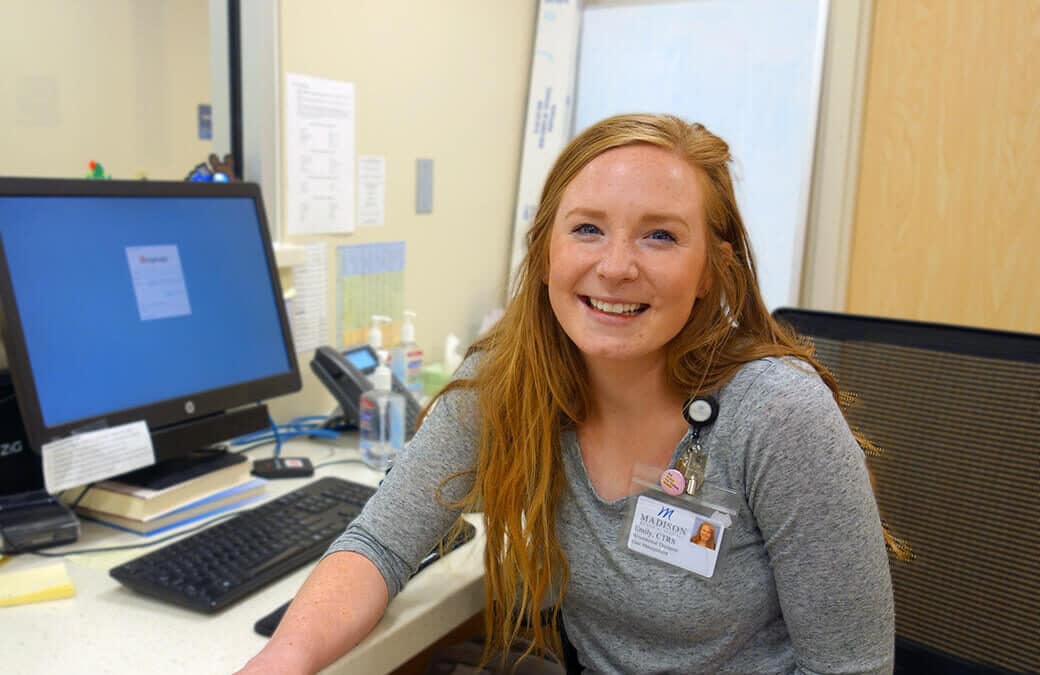Talking “Recreation Therapy” with Emily Johnson
Talking “Recreation Therapy” with Emily Johnson

Story and Photo by Jeremiah Kalb
When patients visit Madison’s Behavioral Health Unit, they work with several professionals to help them return to good mental health.
The most well-known professionals involved in this care include a psychiatrist, social workers, and nurses.
A recreation therapist is a lesser-known professional who is equally vital to a patient’s success.
Emily Johnson, a full-time certified recreation therapist, describes recreation therapy as “helping people discover their zest for living because it’s those activities that you do every day that make you who you are.”
Simply put, Johnson helps patients help themselves.
“But more with a purpose of mindfulness and intent,” she adds.
The roots of recreation therapy first appeared during World War II when the Red Cross provided hospitalized soldiers with recreation therapy programs.
Leisure, recreation, and play make up the foundation of recreation therapy.
Without recreation therapy, a patient may find it challenging to achieve the highest quality of life.
For example, a simple card game checks the boxes for two of the five domains of recreation therapy: mental/cognitive functioning and social function.
“Cognitive thinking processes can really suffer when you’re going through a depression or anxiety,” Johnson points out.
The other three domains include physical functioning, psychological/emotional functioning, and spiritual function.
Johnson came to Madison after an internship at Eagle Mount in Billings, Montana, where she ran programs that ranged from equine therapy to whitewater rafting. Her clients might have suffered a traumatic brain injury or lost a limb.
Despite being nervous about venturing into mental health, Johnson applied and landed the job.
“I like to think I’m a forward thinker,” she says.
The hospital saw the value of Johnson’s therapeutic discipline quickly as the unit prepared for its grand opening in 2021.
“She taught us how important recreation therapy is in the stabilization of mental health crises,” says Marci Crook, Social Work manager.
Johnson’s first assignment on BHU was a tall order. Stand up a recreation therapy program from scratch.
She came well-prepared for this kind of challenge.
Johnson obtained considerable exposure to recreation therapy in various community settings, including starting up and running an adaptive sports camp for youth.
“That was my first experience developing a program that reached a lot of people’s needs because it was open for the community,” Johnson says.
Nine months later, Johnson is in her groove, delivering impactful patient experiences.
“I just love when they come to me after, and they’re like, I felt that was just for me,” she says.
BHU offers four recreation groups a day. Each group can have anywhere from one to 12 people.
Johnson finds psychological/emotional functioning the most challenging domain to work within.
“Just because emotions are hard,” she says. “They’re hard to regulate. It’s difficult to allow yourself to experience the full range.”
For this, Johnson loves facilitating a group called “Music and Emotions.”
“They draw how the music makes them feel,” she says. “Music tells a story on its own and without having to relive certain moments, patients can experience emotions in a safe and controlled setting.”
Fortunately, Johnson and her colleagues are doing their part to stamp out the stigma of mental illness and help others find meaning, independence, and purpose.

